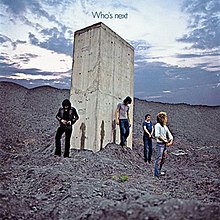Who's Next
| Who's Next | ||||
|---|---|---|---|---|
 |
||||
| Studio album by The Who | ||||
| Released | August 1971 | |||
| Recorded | April–June 1971 | |||
| Studio |
Olympic Studios, Barnes, London; mixed at Olympic Studios "Won't Get Fooled Again" recorded at Stargroves (Rolling Stones Mobile Studio) and mixed at Island Studios, London |
|||
| Genre | Hard rock | |||
| Length | 43:38 | |||
| Label | Track, Decca | |||
| Producer | The Who, Glyn Johns (associate producer) | |||
| The Who chronology | ||||
|
||||
| Singles from Who's Next | ||||
|
||||
| Professional ratings | |
|---|---|
| Review scores | |
| Source | Rating |
| AllMusic | |
| Christgau's Record Guide | A |
| Encyclopedia of Popular Music | |
| Mojo | |
| MusicHound Rock | 5/5 |
| Q | |
| The Rolling Stone Album Guide | |
| The Village Voice | A+ |
Who's Next is the fifth studio album by English rock band The Who. It developed from the aborted Lifehouse project, a multi-media rock opera written by the group's Pete Townshend as a follow-up to the band's 1969 album Tommy. The project was cancelled due to its complexity and conflicts with Kit Lambert, the band's manager, but Townshend was persuaded to record the songs as a straightforward studio album.
The Who recorded Who's Next with assistance from recording engineer Glyn Johns. After producing the song "Won't Get Fooled Again" in the Rolling Stones Mobile Studio, they relocated to Olympic Studios to record and mix most of the album's remaining songs. They made prominent use of the synthesizer on the album, particularly on "Won't Get Fooled Again" and "Baba O'Riley", which were both released as singles. The cover photo was shot by Ethan Russell and made reference to the monolith in the 1968 film 2001: A Space Odyssey, as it featured group members having urinated against a concrete piling protruding from a slag heap.
Who's Next was an immediate success when it was released in August 1971. It has since been viewed by critics as the Who's best record and one of the greatest albums of all time. It was reissued on CD several times with additional songs originally intended for Lifehouse.
By 1970, the Who had obtained significant critical and commercial success, but they had started to become detached from their original audience. The mod movement had vanished, and the original followers from Shepherd's Bush had grown up and acquired jobs and families. The group had started to drift apart from manager Kit Lambert due to his preoccupation with their label, Track Records. They had been touring since the release of Tommy the previous May, with a set that contained most of that album, but realized that millions had now seen their live performances, and Pete Townshend in particular recognized that they needed to do something new. A single, "The Seeker", and a live album, Live at Leeds were released in 1970, and an EP of new material ("Water", "Naked Eye", "I Don't Even Know Myself", "Postcard" and "Now I'm a Farmer") was recorded, but not released as the band felt it would not be a satisfactory follow-up to Tommy.
...
Wikipedia
